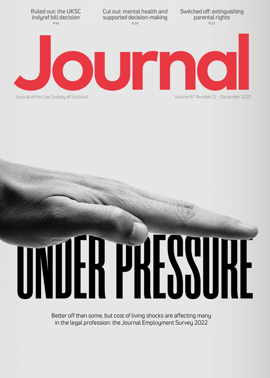Charging for complaints: a bad idea

Our latest edition of Snapshot looked at why the SLCC doesn’t charge a fee for considering complaints. We emphasised that the aim of the Legal Profession and Legal Aid (Scotland) Act 2007 – and one of the universally accepted hallmarks of a good complaints process – is that consumers have the right to complain through an accessible process.
We’ve recently seen several terms of business or letters that indicate an intention to charge a “levy”, a flat fee or time charge for dealing with any complaints which are not upheld. Other firms may not go quite this far but include other hurdles that can deter complainers. Some examples that we’ve seen include:
- clauses in draft agreements that no complaints about handling of the matter can be made to the firm;
- a solicitor refusing to release a payment due to the third-party complainer under a negotiated settlement, unless the complainer withdrew their complaint about the solicitor’s actions in the lead-up to the settlement;
- incorrectly telling a third party complainer that they could only complain via another solicitor;
- strong letters urging a client to “think very carefully” before lodging a complaint, as the firm might decide to report the client to another authority;
- firms insisting that complainers must go through several burdensome hoops, in terms of procedures, timescales, or formats for their complaint, before they will consider the issues;
- firms withdrawing at a crucial time, in response to a negative review or complaint, without being prepared to discuss the issues raised.
Consumer rights
Why do we suggest that none of these examples is good practice?
First, the spirit of the Act and the Law Society of Scotland’s Guidance on Fees make it clear that consumers – just as they would with any other service – have a right to question the actions taken by a solicitor. Secondly, about half of clients who see open and genuine attempts to resolve their concerns, irrespective of whether they receive compensation, will return to the firm. The way the complaint is handled is more important than the fact that they felt they had to raise a concern in the first place. Thirdly, the Society’s article at Journal, May 2022, 49 confirms that any threats or attempts to penalise a client if they complain would be both improper and unenforceable.
This article followed a few complaints upheld by the Society or the Scottish Solicitors’ Discipline Tribunal; others have since been decided along similar lines. Some CRMs (client relations managers) who persisted in their demands, despite the SLCC suggesting that this put them at risk of complaints, have ended up paying fines and compensation to the clients whose complaints were upheld by the Society. In one case, the Society decided that additional fees described as “post-completion work”, that were only charged once a complaint was received, were in fact a charge for the complaint. The Discipline Tribunal decided that a solicitor putting pressure on a complainer to withdraw their complaint had caused a conflict between firm and complainer. The Society’s subcommittees have stated clearly that the perceived merits of a complaint do not alter every complainer’s right, without fear or pressure, to use the legitimate complaints process provided for in the Act.
Taking clients seriously
It’s worth thinking about your terms of business as another tool in risk management. We’re currently engaged in a project doing random checks of terms of business, to find out whether firms are in fact including what rule B4 (information to be provided to client) asks, how they’re notifying clients of their complaints process, and how easy it is for clients to understand the terms. We’ll be reporting on our findings early next year. But in the meantime, it’s worth thinking about the time, effort and cost that you have probably put into your marketing and client onboarding, in order to assure your client that you take them seriously and will act in their best interest, and considering whether your terms are in fact matching up to your assurances.
Some CRMs say that restrictive clauses in their terms of business are merely intended to deter vexatious complainers, but nobody can find a complaint vexatious if it’s never allowed to be expressed. Even if a complaint arises from a misunderstanding, it’s often still telling you something valuable about how effectively you managed expectations.
Perspectives
Features
Briefings
- Criminal court: Farewell retrospective
- Agriculture: A future support framework
- Corporate: Is there a creditor duty?
- Intellectual property: "Reclaiming the UK statute book"
- Sport: Flouting their own rules?
- Succession: Crofting tenancy transfers in intestacy
- Scottish Solicitors' Discipline Tribunal: December 2022
- Property: Conveyancing – the future is in our hands
- In-house: With a fair wind






